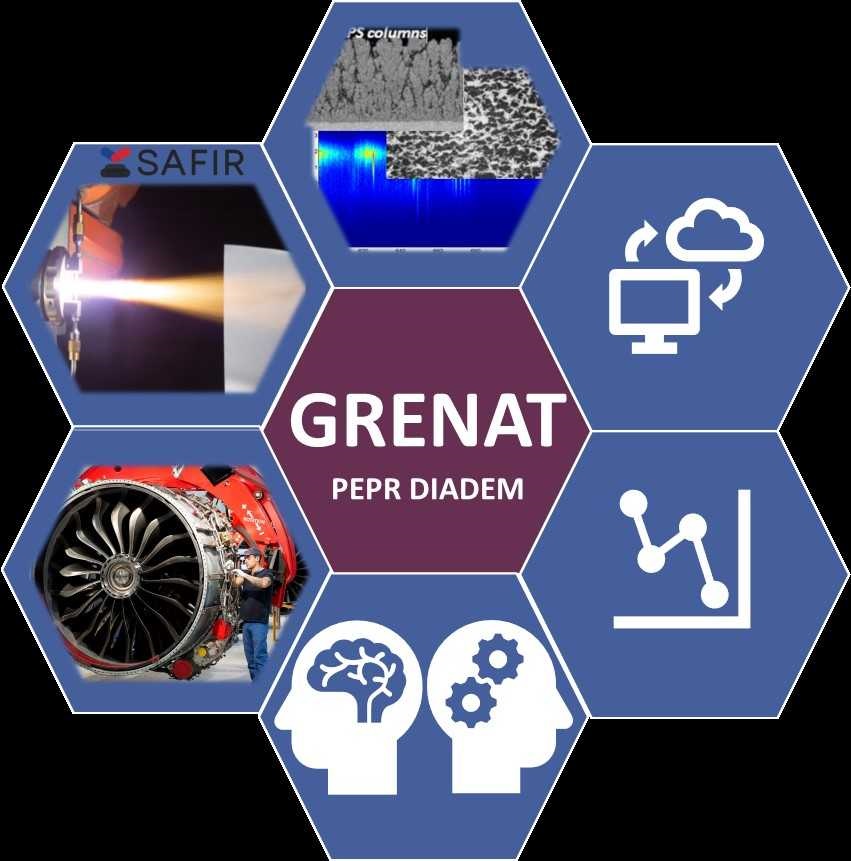
GRENAT: data-auGmented mAterial engineeRing for advaNced surfacE functTionalization
Coordinator: Vincent RAT
IRCER – Institut de Recherche sur les CERamiques
(UMR 7315 CNRS/Univ. Limoges)
Keywords: Surface engineering, Artificial Intelligence, elaboration processes, thermal spraying, thermal barrier, abradable deposition, instrumentation, sensors, high-throughput diagnostics and materials characterization, data reduction

Thermal spraying is a family of coating processes that uses a source of enthalpy and momentum to spray materials to form a coating. The latter consists of a stack of lamellae, whose thermokinetic state on impact with the substrate determines the coating’s properties.
Spraying covers a wide spectrum of processes (cold gas spraying, combustion, plasma) and can therefore be applied to all major material categories (polymers, metals, ceramics, cermets, etc.). Operating parameters, such as the characteristics of the initial materials and process parameters, can be used to adjust the properties of coatings on complex geometries. Thermal spraying is a mature technology used in a wide range of industrial sectors, including the automotive, aerospace, medical, industrial gas turbine and printing industries. Coatings are exploited for their resistance to high temperatures and corrosion (e.g. thermal barriers, TBC), wear resistance, chemical resistance, electrical insulation, etc… However, the relatively large number of process parameters, their coupled and non-linear effects on the thermo-kinetic treatment of particles, and the time and space scales describing the mechanisms spanning several orders of magnitude, make experimental process optimization and the implementation of numerical modeling and simulation complex. Artificial Intelligence (AI) is an alternative way of optimizing complex processes using data generated by sensors and advanced diagnostic systems. AI enables the development of sustainable, resource-efficient industrial processes, reducing energy requirements and waste without sacrificing system quality. GRENAT project addresses the topic on the acceleration of the mastery of synthesis and shaping processes of DIADEM relying the technological platform of advanced surface functionalization named SAFIR.
The latter results from the joint laboratory between the Institute of Research of Ceramics of the University of Limoges (UMR CNRS 7315), SAFRAN and OERLIKON. The partnership will also comprise of CEA-LIST specialized in AI, data science and innovating sensors. The project GRENAT will be the first AI brick, as a proof of concept, for predicting coating properties on two complementary process/material pair model systems (atmospheric plasma spraying/abradable coatings and suspension plasma spraying/TBC) in the SAFIR environment and will interact with target projects of DIADEM named RUBIS on ceramic processes and DIAMOND on database and AI tools.
The first step will be to establish a database on material/process combinations, based on in situ and operando sensors/diagnostics, SEM micrographs and deposit properties. Non-contact and non-destructive high-throughput methods for characterizing ceramic deposits will be favored and shared with RUBIS. A data storage and accessibility infrastructure based on FAIR principles will be created and will interact with the DIAMOND project.
The second major step will be to study the intrinsic dimension of the data and to define the nature of the approach – connectionist or symbolic AI – according to the quantity and nature of the data.
Finally, in the last stage, the models will be integrated into the SAFIR pre-industrial platform, whose new data infrastructure will be designed in such a way as to enable the subsequent integration of other processes facilitating the structuring of the coatings scientific community and, more broadly, that of materials.